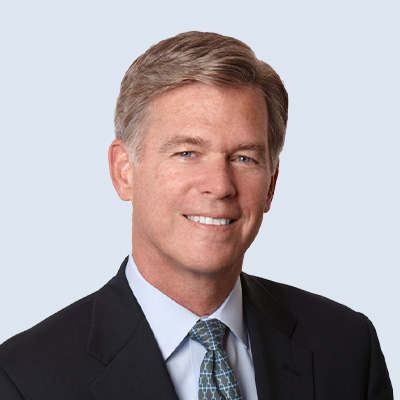Gary Tubridy: I’m here with Emmanuel Lingner, CEO of Cytiva and group executive at Danaher. And we’re speaking on the subject of an enduring company’s recipe for success. I am delighted to be here with you.
Emmanuel Ligner: Thank you.
Gary Tubridy: Thank you so much for coming to us. So you’re speaking as a keynote at our event here on the subject of Enduring Leadership. And you are talking about the recipe for a company’s enduring success. I’m wondering, do you have a way of thinking about or defining enduring companies?
Emmanuel Ligner: I think for us it’s about bringing bring the human at the center of the recipe of enduring, of resiliency. I think it’s about a group of people which really embrace changes. And I think this is really to have the human that accept the change and embrace the change and constantly change.
Gary Tubridy: Yeah. It’s so interesting to hear that and executives like you say, we used to think about the product made for the great company. In fact, you got to have good product, but the difference is in the people.
Emmanuel Ligner: But I think today you have so many products. We are in a global economy. You can have fantastic product from China, a fantastic product from Europe, from the U.S., from everywhere. And innovation is constant. But if you do not bring the human at the center, you know, it’s incredible because you still need commercial people these days, right? You can sell things through Internet for sure, but you still need people to make sure that they handle your Internet, make sure that you have people manufacturing your product, shipping your product, have great quality of your product. It’s all down to the employee, the human side of a business.
Gary Tubridy: Yeah. You know, one of the things that you’ve spoken about as an element of the recipe is alignment of vision and mission and purpose. Tell me more about the need for that alignment and why it’s so important.
Emmanuel Ligner: I think, again, I’m a fervent believer of a purpose-driven organization. So when you are a 16,000 people organization in more than 40 countries, with all the differences that you may have around the culture, but also where you come from, that incredible diversity. A group like Cytiva is composed of so many different companies that was acquired over the time either by Amazon Bioscience, Pharmacia or GE or now Cytiva, a part of Danaher. You need to find something that everybody will resonate. Everybody has their own reason to come to work. But if everybody has a particular common reason to come to work, it gives us incredible sense of purpose and alignment of the organization. And I think the first thing that a leader needs to do is to really realize that, I say that very often that as a leader, you’re custodian of that organization. Part of the Cytiva group of companies, the oldest one was created in 1733. So it’s more than 289 years ago. So if you think about yourself as a leader of this organization, I’ve been here five years, so I’ve been the CEO of that history, of that legacy for 1.7% of time. All right. And let’s say I’m going to be here 10 years. It’s only 3% of the entire history of the company. So as a leader, you need to think that you are here as a custodian and your role is to make sure that you’re going to transmit this to the future generation of leaders which are coming which are in your organization that you are raising. And you need to get that organization in a better shape than what it is.
Gary Tubridy: That’s what custodians do.
Emmanuel Ligner: That’s what custodians do. It’s constantly and continuously improve the organization to make sure that it’s in the right shape for the future. And so sense of purpose and realization that you’re just a custodian as leaders and that you people also and there are people also. But we have that common goal. And it’s just, I think, the right thing to do again, for enduring for resilience.
Gary Tubridy: So I’m going to read something here. The Cytiva vision. Yeah. And I want you to comment on it. A world in which access to life-changing therapies transforms human health. That’s a powerful vision. So people are connecting with that. Tell me how that informs the strategy and energizes the team.
Emmanuel Ligner: Yeah, it does in a sense that, listen, what we do really, really matter. Yeah, we help the scientists to understand the disease, to try to find a cure. And you know, today with genomic medicines in particular, we’re talking about curing a disease where in the past it was about life expectancy, expectation of living five or six more years post-surgery or post-chemotherapy. Today with the genomic medicines, we’re talking about curing. All right. And so it’s very important what we do extremely matter from research development to manufacturing of those life-changing therapies. But it’s also how do you make it accessible to everybody? Right. It’s not only about the rich country. It’s about also making sure that you can bring those technologies to as many people as possible. And so what you do in formatting your strategy is to say, okay, this is the goal. This is the flag that you plug out there. And then you say, okay, how do we do this? Well, we do this by having a mission, which is very, very clear, which is advance and accelerate therapeutics. So it’s all about speed. So you say, okay, it’s about speed and then it’s about productivity. And then you use those things and say, okay, what I’m going to develop product which are going to bring speed to our customers, I’m going to develop product which are going to bring productivity to our customer, the pharma and the biotech industry. And so everything which you’re trying to do in terms of your value proposition that you bring to customers, it’s kind of coming down to that flag, that vision that you put out there, followed by a clear mission and you constantly, constantly have to repeat it to your own people, but also to the industry. And it’s very, very clear. It’s very simple to understand, and it gives a sense of purpose as well.
Gary Tubridy: And it attracts people. That are connected to that.
Emmanuel Ligner: It does. And what you do as well is you make sure that when we talk about patients, even if we don’t make the drugs, but we really enable the research, development and manufacturing of those drugs, of those new drugs or the therapy that cure people. You talk about it by bringing your associate’s story. Because at 16,000 people, you have diabetic people, you have people who have their spouse that has cancer. You have some of our own which have a relative or some kids which have those horrific gene deficiencies that again can be talked. So you go and ask them if they will tell the story because who are the patients? It’s you, it’s me. It’s a crew, it’s our family, it’s our friends, our neighbors. And so it’s us. And so you again, you, you try to connect the dots between what you can offer, what you’re doing and the benefit that it has for society.
Gary Tubridy: Yeah. Tell me a little bit about the culture at Cytiva that you’re able to build around this superb mission.
Emmanuel Ligner: It’s a team of people that have a common goal, common purpose, vision and mission very, very clear. But it’s a team of people that are collaborating internally, but also externally. In this industry, nobody can do it alone. Yeah, All right. You have to think about the COVID fight. For example, you had the university that finds something. Then you have the small biotech like Biontech in Germany or Oxford University, and then you needed the big power of the large pharma, AstraZeneca, Pfizer, and then you needed people like us that provide all the tools. And then you need the government and then you needed the logistician specialist.
It’s incredible what we’ve been able to do in a short period of time, but you needed to collaborate and this constantly, this need of collaboration. So internally, externally and so no silo. I will say something else, no individualism. I think it’s something that killed the team is the people that think “me first.” You need to think “patient first”, customer second and then company third. You know, you need to put your sense of purpose and mission before your own personal goals. And that’s, I think, part of the culture. I would say the last piece, which is very important, is diversity. 16,000 people, 40 countries, but also coming from so many different companies that join forces, you need to have a respect of diversity. And so diversity is also linked to inclusiveness. All right. You need to be inclusive to be able to have access to that diversity. So I will say that those things are really part of the culture.
Gary Tubridy: One of the things that you have said which I fundamentally agree with is you’ve got to be resilient because it can be a slog and things don’t always go the way you want them to. You got to be resilient in the face of adversity.
Emmanuel Ligner: But you become resilient when you believe in your mission. When you save life indirectly, you are automatically resilient. All right. During COVID, we could not shut down any plant. We had to keep going. And by the way, we created sight even in the middle of COVID. Right. When we spin off from GE Healthcare and created Cytiva. So but that resiliency comes from that absolute willingness to change and willingness to drive that vision and mission to a reality as much as possible. It is probably part of the culture as well.
Gary Tubridy: Well, yeah, it is, isn’t it? Because you’re part of something big and the mission is big. And I have to make that happen. We have to make that happen. And that tends to make you stronger, doesn’t it?
Emmanuel Ligner: You know, it’s interesting. I was talking today was with my colleagues in the car. As a CEO of the last five years, I pick up the business from Karen Murphy that you know, and then and then the first thing that I had to do the board of GE ask us to spin off the biopharma business to Danaher and create Cytiva. So that was the second year. 15 months to make it a reality. Then you create cytiva and you have to make it stand alone. And so that was another 18 months. In the meantime, you fight COVID.
Gary Tubridy: It’s been busy.
Emmanuel Ligner: It’s been extremely busy. And now what we’re doing is we are putting Paul and Cytiva together. And so over the last five years, you have no routine. Yeah. All right. But the team is extremely tired, of course, because you stretch them and so on. But at the end of the day, you realize and you look at the last 16 years in this industry, it’s an extremely fast-paced industry. So I think this is another thing that you need to like to be in an extremely fast-paced industry, constantly changing, you know, genomic medicines. Five years ago, six years ago was really, really early phases. Today you have four or five CAR-T therapy approved, you know, a couple of gene therapies. You need to really like this extremely fast-changing, innovating businesses where things are becoming very irrelevant very quickly and constantly turning and growing and it can really incredibly fast pace.
Gary Tubridy: And that’s probably part of your culture too.
Emmanuel Ligner: I think it is.
Gary Tubridy: People want, expect the change. They expect challenges. And they gravitate to businesses that offer that opportunity.
Emmanuel Ligner: That’s right. And as leader, you need to understand what does it mean change.
Gary Tubridy: Yeah.
Emmanuel Ligner: It means that some people will be super exciting. You know, the change curve, you get super exciting, then you go into that valley of despair and then you bounce back and you see the light kind of. But sometimes this cycle goes up and down, up and down, up and down. Because of the market, because of a failure of a compound and so on. We get all very excited when Biogen launched their first Alzheimer drug. And then very disappointed as well at the same time is very shortly after. And so it’s that acceptance of changing curves. And as leaders, you need to make sure that you understand what it means for your associates. Need to have a lot of listening skills. And I think something, again, which is very…going back to the human sense…it’s empathy. You need to have a lot more empathy when you go through a lot of change.
Gary Tubridy: There’s a term you’ve used that I like. You’ve got to keep your eye on the say-do ratio. Yeah. And I, you know, we’re consultants, we love ratios. And the say-do ratio is something that I found intriguing. Tell me more about that and why.
Emmanuel Ligner: Well, again, I have always liked to work for leaders that had true authentic self. And when they were talking about I want you guys to be accepting the change and have empathy. They were accepting the change. They were changing. And they were showing empathy. All right. I think it’s very important to walk the talk. You cannot tell your people we’re going through a recession. We need to tighten the belt. And then you take your team to a super expensive restaurant. Or vice versa. You know, and I think this is just it’s about authenticity. And you have to say what you do and do what you say and that reflects on the organization. Right. I think you have to walk the talk.
Gary Tubridy: And trust is an element here as well that has to be earned. And you do that by walking the talk.
Emmanuel Ligner: Exactly. You know, when you said to your people that you’re empowering them, you cannot empower them, and then two weeks later, give them a phone call and breathe down their neck and micromanage them. And I think this is really important. You build trust by setting up your organization free, but also setting up the environment so that they are okay to tell you “I disagree.” Or care just to tell you “well, today I don’t feel good. I’m not 100%. Can we change our meeting?” You need to set up this environment and you set up this environment by walking the talk. By it’s okay to have a grumpy day. All right. My team knows that Thursday is my grumpy day.
Gary Tubridy: My team would tell me most days are my grumpy day.
Emmanuel Ligner: But it’s okay to be grumpy. It’s okay to be annoyed by something. And you know, when I was working in the U.S., I remember one day I arrive and everybody in the morning you say, “Hello, how are you doing? How are you doing in America?” And everybody expects you to answer “great.” Yeah. And when you say “so, so not so bad, but I’m. Nah, I’m not good today.” People are shocked. People are surprised. But it’s okay. You as a leader, you can be a bit in that valley of despair from time to time if you know about it and if you are transparent about it.
Gary Tubridy: Tell me we reference to inclusivity before. Tell me a little bit about what an inclusive culture enables you to do that you have trouble doing without being inclusive. What is it giving you?
Emmanuel Ligner: What I think. Especially in this fast-paced time where innovation is very important. It’s allowing you to have really different talent. Yeah. And I think that differences of talents bring you and incredible resiliency and endurance. Different times need different talents, but the diversity of talent is very important. And again, having a trusted, diverse talent that complements each other. I was talking about my Grumpy Thursday, but also I need some people that are going to listen to me when I need to vent and everybody has to vent, right? You can vent at home, but it’s more important if you have a trusted buddy inside your organization. And that’s not everybody which has that capability just to listen and that empathy. So when you build a team and when you build an organization, you really need to make sure that that organization is complementary. Complementary to yourself. So know yourself, know your strengths and know your weakness and surround yourself that are going to of people that are going to complement your weakness, I will say. And so that’s why it’s diverse. You need people that love the numbers, that are good at Excel, that’s your finance team, and there are going to be tight when they need to be tight. Right. And tough when they need to be tough. But you need also people which are really good at judging, judging the talent, making sure that they have this empathy and making sure that they are capable of motivation in people. You need people which are capable of leading without authority, influencing. So it’s really a huge, diverse people that you need and diverse culture. And just again, bringing the human at the center of your organization. I like this term of humanocracy. Yeah, right. It’s everything down to the people.
Gary Tubridy: In a time of constant change. What are the things that you have to hold constant and not change?
Emmanuel Ligner: I speak a lot about a healthy business. And what does it mean a healthy business? It’s a healthy employee, but also it’s a business which performs on the bottom line. And I think this is a very important constant in fast-paced growth or in deceleration. You have to constantly explain that it is important that we keep performing and delivering to the shareholders why and what we’re doing. So it’s that constant balance about your sense of purpose, but not at any cost. And so it’s a lot of education and that sense of say-do ratio and perform, I think it’s a very important constant because that’s part of your custodian and that gives you the ability to continue to acquire new technology, to invest in capacity, in education of your people. So you have to explain why you’re doing it. What does it mean to have a healthy business, cut costs when you have to cut costs. To continue to deliver that bottom line, which is so important for the corporation. But you have to educate and you have to communicate a lot on this. I think that’s a very important constant.
Gary Tubridy: Outstanding.
Emmanuel Ligner: Of course.
Gary Tubridy: Emmanuel, enjoyed talking with you. Thanks for joining.




